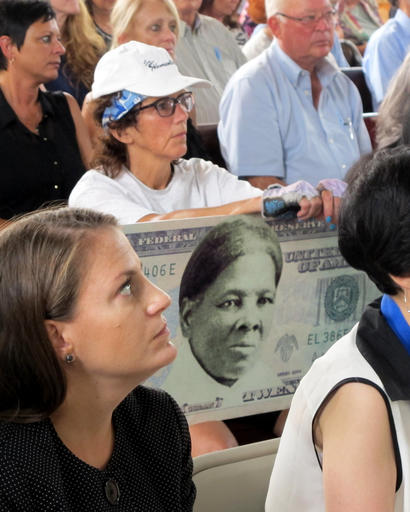Editorial: Major strides being taken to recognize impacts of women

In this Monday, Aug. 31, 2015, file photo, a woman holds a sign supporting Harriet Tubman for the $20 bill during a town hall meeting at the Women’s Rights National Historical Park in Seneca Falls, N.Y. A Treasury official said Wednesday, April 20, 2016, that Secretary Jacob Lew has decided to put Harriet Tubman on the $20 bill, making her the first woman on U.S. paper currency in 100 years. (AP Photo/Carolyn Thompson, File)
Throughout history women have been shackled by gender roles and have been expected to be voluntarily subservient to men. In fact, women rarely show up in the textbooks that educate students. This gender inequality has been in place in “American history” dating back to the 13th century. Until the last few decades, the American idea of women as equal partners in the work force was denied legally, religiously, and traditionally. In recent years women have overcome many discriminatory boulders by erasing stereotypes and paving their own trails. The year of 2016 is the year of women. This year has seen big changes for the ladies who wear the pants.
Many strides have been taken to appreciate and uplift women. Treasury Secretary Jacob J. Lew announced that Harriet Tubman, who was an abolitionist and humanitarian, would replace former president Andrew Jackson on the front of the $20 bill. Tubman will become the first woman in over a century and the first African American to appear on the front of a paper note. Other women are expected to take their place on bills as well. The final designs of the new $20, $10 and $5 bills are scheduled to be completed and placed into circulation in 2020, which will mark the 100th anniversary of the passage of the 19th Amendment, which gave women the right to vote. Countries like Britain are following the same path by recognizing Jane Austen, an English novelist. Starting in 2017 Austen will take the place of Charles Darwin on the opposite side of the currency from the Queen on the £10 notes.
Not only will women be seen nationally on paper bills, but they can also be seen on television expressing their opinions and being heard. Innovating women like Hillary Clinton, Senator Barbara Mikulski, Olympia Snowe, the youngest Republican woman ever elected to the House of Representatives, and Shirley Chisholm, the first African-American woman to serve in Congress and run for the presidency, are all some of many females who have or who are presently representing the 22% of female parliamentarians. Senator Hillary Clinton in particular has made the ultimate stride for women as she runs for the highest office of the President of the United States. If Clinton wins, she will become the first female president of the United States. If elected, she promises to make big changes in the way that the system works for everyday Americans. She vows to dedicate her time to advancing gender equality and has positioned herself to be a champion for women rights.
Changes have also been made in the armed services. Up until January 2016 women were limited to gender-based restrictions in the armed forces. Women did not have access to combat jobs that required “a man’s strength.” Now women can now serve alongside men and they can serve in any combat position as long as they meet the physical standards. As a result of these changes, about 220,000 jobs will be obtained by women and women will make up about 10 percent of the entire active and reserve force. Most of these jobs are in the Army and Marine Corps infantry and armor units which has been 93% dominated by men.
Only a few months into 2016 and women have already made their impact. These changes will continue to loosen the traditional shackles that have been and still are placed on women. As a first world country our changes can act as a first step for women’s rights all around the world.











